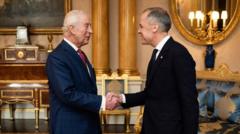In an unprecedented political gesture, Canadian Prime Minister Mark Carney has formally invited King Charles III to Canada for a historic visit, marking the first time a British monarch will address the Canadian parliament since 1977. This invitation serves not only as a celebration of the Crown but as a clear statement of Canada’s autonomy in the face of external pressures, particularly from U.S. President Donald Trump, who has frequently suggested that Canada’s identity is akin to that of a "51st state."
The invitation highlights a significant evolution in the relationship between Canada and the British monarchy over the past century. A decade ago, Prime Minister Stephen Harper stirred controversy by emphasizing Canada's ties to the Crown, sparking debates about republicanism and independence. In contrast, Carney’s invitation carries a dual message: it underscores Canada's uniqueness while simultaneously reinforcing the historical connections that many Canadians view with indifference.
The recent discourse surrounding the monarchy reflects a nation wrestling with its identity. While King Charles's coronation drew attention to the Crown's colonial past, Prime Minister Carney aims to use this visit to assert Canada’s sovereignty in light of Trump's tariff actions that threatened local economic stability. The historical weight of this event cannot be understated; Carney expressed that the King’s visit "clearly underscores the sovereignty of our country," emphasizing a renewed commitment to the constitutional monarchy.
Historically, loyalty to the Crown served as a means for Canadian leaders to distinguish themselves from their American counterparts but dwindled amid escalating republican sentiments within Canada since the 1960s. The political ambiance has shifted yet again under Carney’s leadership, hinting at a government that may embrace the monarchy more robustly as a stabilizing force amidst fluctuating political climates.
However, the visit is not without its critics, especially in Quebec, where political groups like the Bloc Québécois continue to advocate for a separation from the monarchy. As the King and Queen prepare for a short visit, arriving Monday and departing Tuesday, there's anticipation around their planned address. The palace has promised that the throne speech will symbolize the deep connection between the Crown and the Canadian people, making this visit a potentially pivotal moment in the ongoing evolution of Canadian identity in a modern context.
With Prime Minister Carney’s government emphasizing strategic ties to Europe, this visit will also be instrumental in demonstrating Canada’s shift toward new alliances rather than reinforcing dependence on the U.S. The King's arrival is expected to captivate many Canadians, yet it primarily serves as a poignant reminder of the political complexities surrounding Canada’s historical ties and contemporary challenges in asserting national identity on a global stage.
The invitation highlights a significant evolution in the relationship between Canada and the British monarchy over the past century. A decade ago, Prime Minister Stephen Harper stirred controversy by emphasizing Canada's ties to the Crown, sparking debates about republicanism and independence. In contrast, Carney’s invitation carries a dual message: it underscores Canada's uniqueness while simultaneously reinforcing the historical connections that many Canadians view with indifference.
The recent discourse surrounding the monarchy reflects a nation wrestling with its identity. While King Charles's coronation drew attention to the Crown's colonial past, Prime Minister Carney aims to use this visit to assert Canada’s sovereignty in light of Trump's tariff actions that threatened local economic stability. The historical weight of this event cannot be understated; Carney expressed that the King’s visit "clearly underscores the sovereignty of our country," emphasizing a renewed commitment to the constitutional monarchy.
Historically, loyalty to the Crown served as a means for Canadian leaders to distinguish themselves from their American counterparts but dwindled amid escalating republican sentiments within Canada since the 1960s. The political ambiance has shifted yet again under Carney’s leadership, hinting at a government that may embrace the monarchy more robustly as a stabilizing force amidst fluctuating political climates.
However, the visit is not without its critics, especially in Quebec, where political groups like the Bloc Québécois continue to advocate for a separation from the monarchy. As the King and Queen prepare for a short visit, arriving Monday and departing Tuesday, there's anticipation around their planned address. The palace has promised that the throne speech will symbolize the deep connection between the Crown and the Canadian people, making this visit a potentially pivotal moment in the ongoing evolution of Canadian identity in a modern context.
With Prime Minister Carney’s government emphasizing strategic ties to Europe, this visit will also be instrumental in demonstrating Canada’s shift toward new alliances rather than reinforcing dependence on the U.S. The King's arrival is expected to captivate many Canadians, yet it primarily serves as a poignant reminder of the political complexities surrounding Canada’s historical ties and contemporary challenges in asserting national identity on a global stage.


















